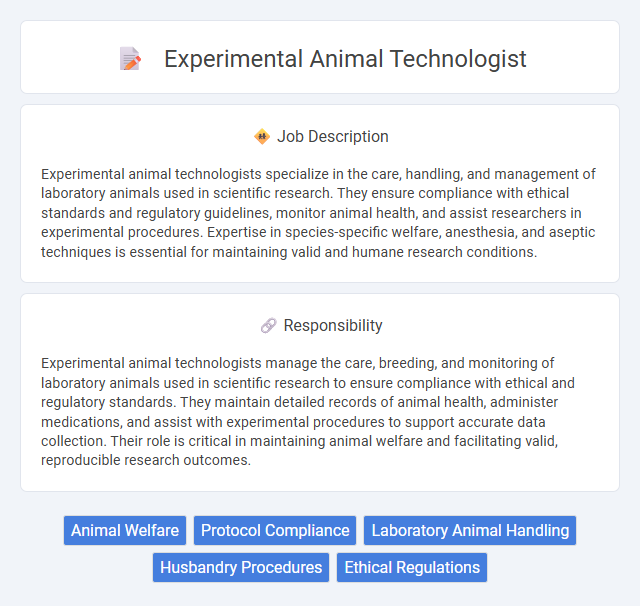
Experimental animal technologists specialize in the care, handling, and management of laboratory animals used in scientific research. They ensure compliance with ethical standards and regulatory guidelines, monitor animal health, and assist researchers in experimental procedures. Expertise in species-specific welfare, anesthesia, and aseptic techniques is essential for maintaining valid and humane research conditions.
Individuals with a strong interest in biology and animal care are likely to find the role of an experimental animal technologist suitable, as it involves maintaining laboratory animals and supporting research projects. The job may be challenging for those who are uncomfortable working with animals under experimental conditions or in controlled environments that require meticulous attention to detail. People with patience, good observational skills, and a commitment to animal welfare have a higher probability of thriving in this career.
Qualification
Experimental animal technologists require a strong foundation in biological sciences, often holding degrees in biology, zoology, or veterinary technology. Essential qualifications include proficiency in animal care techniques, knowledge of laboratory protocols, and certification in laboratory animal handling or welfare standards. Experience with ethical regulations and animal welfare legislation is critical for ensuring compliance in research environments.
Responsibility
Experimental animal technologists manage the care, breeding, and monitoring of laboratory animals used in scientific research to ensure compliance with ethical and regulatory standards. They maintain detailed records of animal health, administer medications, and assist with experimental procedures to support accurate data collection. Their role is critical in maintaining animal welfare and facilitating valid, reproducible research outcomes.
Benefit
Experimental animal technologists likely gain valuable hands-on experience in animal care and research methodologies, enhancing their expertise in biomedical sciences. The role possibly offers opportunities to work in cutting-edge laboratories, contributing to scientific advancements and drug development. Job benefits may include competitive salaries, comprehensive health insurance, and access to professional development programs.
Challenge
Working as an experimental animal technologist probably involves managing complex ethical and welfare challenges related to animal care and experimental procedures. Daily tasks may require precise attention to detail and adaptability due to the unpredictability of biological responses and experimental outcomes. The role likely demands continuous learning and strict adherence to regulatory standards to ensure both scientific integrity and animal well-being.
Career Advancement
Experimental animal technologists play a crucial role in biomedical research by managing and caring for laboratory animals, ensuring compliance with ethical standards and protocols. Career advancement opportunities often include progressing to supervisory or managerial positions such as laboratory animal facility manager, research associate, or veterinary technician specialist. Gaining certifications like the Laboratory Animal Technician (LAT) or Laboratory Animal Technologist (LATG) credentials enhances expertise and opens pathways to higher-level roles in research institutions or pharmaceutical companies.
Key Terms
Animal Welfare
An Experimental Animal Technologist ensures strict adherence to animal welfare standards by monitoring the health, behavior, and living conditions of laboratory animals used in research. They implement ethical protocols and regulatory guidelines to minimize distress, pain, and suffering during experimental procedures. Their role is critical in maintaining humane treatment and supporting the reliability of scientific outcomes through responsible animal care.
Protocol Compliance
An Experimental Animal Technologist ensures strict adherence to research protocols involving laboratory animals, maintaining ethical standards and regulatory compliance. They meticulously document all procedures and animal care activities to meet institutional and governmental guidelines such as those set by the IACUC and AAALAC. Their role is critical in minimizing variables and ensuring data integrity for accurate and reproducible scientific outcomes.
Laboratory Animal Handling
Experimental animal technologists specialize in laboratory animal handling, ensuring the proper care and management of animals used in scientific research. They are responsible for maintaining animal welfare standards, performing routine health checks, and assisting with experimental procedures to support accurate and ethical research outcomes. Proficiency in species-specific handling techniques and knowledge of regulatory compliance are essential for maintaining the integrity of both the animals and research data.
Husbandry Procedures
Experimental animal technologists specialize in husbandry procedures that ensure the health and well-being of laboratory animals used in research. They manage environmental control, including temperature, humidity, and sanitation, while monitoring animal nutrition and welfare to comply with ethical standards and regulatory guidelines. Mastery of husbandry techniques reduces experimental variability and supports reliable scientific outcomes.
Ethical Regulations
Experimental animal technologists ensure compliance with strict ethical regulations governing the use of animals in research, including adherence to the 3Rs principle--Replacement, Reduction, and Refinement. They maintain welfare standards by monitoring animal health, behavior, and living conditions to minimize pain and distress during experimental procedures. Their role involves preparing detailed reports for institutional review boards and regulatory agencies to guarantee transparency and legal compliance in all animal research activities.
 kuljobs.com
kuljobs.com